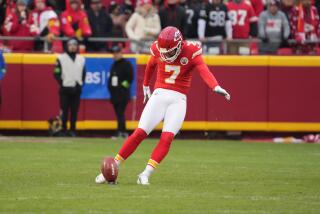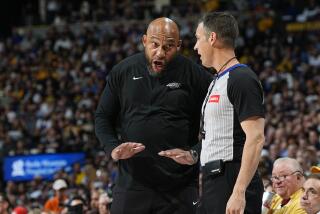Making Heads or Tails of Toss
- Share via
My dad is a retired physicist and can spend hours thumbing through old math books and testing equations. Those genes must have skipped a generation, though, because a) I can’t grasp it, and b) even if I could, those giant books would never fit in my laptop bag.
But a recent study performed by statisticians at Stanford and UC Santa Cruz caught my interest. The new mathematical analysis suggests that tossing a coin is inherently biased: A coin is more likely to land on the same face it started out on.
“I don’t care how vigorously you throw it,” Stanford statistician Persi Diaconis told Science News, “you can’t toss a coin fairly.”
NFL teams should pay close attention to this. After all, the way things have gone this season, the team that wins the overtime coin toss has a significant advantage. In eight of this season’s 11 overtime games, the team that won the coin toss won the game.
Just imagine how the San Diego Chargers felt last Sunday, starting overtime in Indianapolis by putting the ball right back into the hands of Peyton Manning after the Indianapolis Colt quarterback had led his team back from a 15-point deficit in the fourth quarter.
All Manning had to do was put the Colts in field-goal range -- he did that with a run and two passes -- and let Pro Bowl kicker Mike Vanderjagt put the victory on ice. Vanderjagt, who’s especially deadly in the climate-controlled RCA Dome, effortlessly kicked the 30-yard game-winner.
The NFL has got to come up with a better, fairer way to decide overtime games. Asking a quarterback such as Manning to drive the offense into field-goal range, against a defense that spent much of the second half on the field, is a lot different than asking him to score a touchdown. I’m not suggesting that the league rule out overtime field goals -- nor do I think the NFL should switch to the college method of giving each team a possession at the opponent’s 25-yard line, which seems contrived and gimmicky.
But maybe the overtime kickoff should be moved up to the 35, where it used to be before 1994 when the league moved kickoffs back to the 30 to encourage more returns and fewer touchbacks. That way, kickers would have a much better chance of forcing a touchback and, therefore, the team that gets the ball would be less likely to essentially end the game with a big return.
The overtime rule was instituted in 1974, and, for the first 20 years, the coin toss seemed to be a non-issue. In fact, the team that lost the toss actually had a slight edge in victories: 101-99 counting playoffs, and 94-94 in the regular season.
The kickoff was moved back in 1994, and the numbers started to change. In the last decade, teams that won the overtime toss are 103-69.
I’m no physicist, but even I can recognize that imbalance. The NFL’s influential competition committee studied the overtime system a couple of years ago and determined it conferred no competitive advantage either way, a conclusion that definitely isn’t supported by this season’s numbers. Don’t hold your breath for any change in the near future.
So, in the meantime, teams might want to get their hands on that Stanford coin-toss study. It might be their best option.
*
A few STATS Inc. gems of the week:
* Miami has scored a first-quarter touchdown in seven consecutive games.
* Cleveland has scored a total of only 14 points in its last three games, all coming in the first quarter on touchdown receptions by Dennis Northcutt.
* Houston, which plays host to Cleveland on Sunday, has alternated wins and losses in its first seven home games -- L, W, L, W, L, W, L.
* Cincinnati is 2-5 on the road and 0-5 on the road outside the state of Maryland; their two road victories were over Baltimore and Washington.
* Philadelphia has 31 touchdown receptions but only two were made by wide receivers other than Terrell Owens. Todd Pinkston caught one in Week 10, and Freddie Mitchell caught another on Monday.
* Detroit quarterback Joey Harrington has not had more touchdown passes than interceptions in any of his last eight games.
* When Minnesota plays at Washington on Sunday, it will be a reunion of Viking Coach Mike Tice and Redskin Coach Joe Gibbs. Tice played tight end for Gibbs in 1989 and had one reception.
* Even though Atlanta is 11-3, it has outscored opponents by only five points, 314-309.
* The New York Giants have gone two consecutive seasons without a victory in December, going 0-8 in those games.
* Eli Manning has completed 45.3% of his passes, the lowest completion percentage by a Giant quarterback since Scott Brunner in 1981 (41.6%, minimum 150 attempts).
*
It was a rough season for the Tennessee Titans, and their schedule did them no favors. They played three consecutive games on the road, twice faced Indianapolis when the Colts were coming off 10 days’ rest, and had consecutive short weeks this month with a Monday night and Christmas night games.
“You can point it out, but it’s like arguing a call,” Titan Coach Jeff Fisher said when asked whether he planned to speak with the league about the scheduling. “What good does it do?”
*
Denver linebacker D.J. Williams was USA Today’s defensive player of the year at Concord De La Salle High. In his last season at the University of Miami, he was an All-Big East selection and a Butkus Award finalist. And he has been a Bronco starter throughout his rookie season.
But, according to Williams, the first and only time he has ever intercepted a pass -- at any level -- was when he picked off a throw by Tennessee’s Billy Volek last Saturday.
“I’ve been close to about a thousand of them,” he said. “But it felt good to finally get one. That was one of my goals, to break the curse or whatever it was and get an interception.”
*
(BEGIN TEXT OF INFOBOX)
Making Quick Work of Extra Time
The shortest overtime games in NFL history:
0:14 New York Jets 37, Buffalo Bills 31, Sept. 8, 2002
0:16 Chicago 37, San Francisco 31, Oct. 28, 2001
0:17New Orleans 20, Seattle 17, Nov. 16, 1997
0:21 Chicago 23, Detroit 17, Nov. 27, 1980
0:30 Baltimore 29, New England 23, Sept. 4, 1983
0:55 New York Giants 16, Philadelphia 10, Sept. 29, 1985
Note: There have been 20 overtime postseason games dating to 1958. In 17 of them, both teams had at least one possession (Last time: Philadelphia 20, Green Bay 17, Jan. 11, 2004).
Source: NFL
More to Read
Go beyond the scoreboard
Get the latest on L.A.'s teams in the daily Sports Report newsletter.
You may occasionally receive promotional content from the Los Angeles Times.











